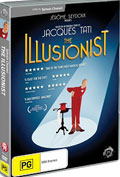
France 2010
Directed by
Sylvain Chomet
88 minutes
Rated PG
Reviewed by
Sharon Hurst

Illusionist, The (2010)
Synopsis: Tatischeff, an aging magician who works the vaudeville theatres of Paris. It’s the late 1950s and as his act becomes progressively less popular, he takes a trip to Edinburgh, hoping to get a gig there. There he meets Alice, a young hotel room-maid, and the two strike up a friendship. Tatischeff buys her gifts, which she somehow believes are conjured through magic. As Alice matures and magic fades the illusionist must move on.
Rarely is painterly animation used to such stunning effect. Exquisite, poignant, whimsical, simple and complex – all these words could be used to describe this remarkable film from the director who gave us the equally marvellous Les Triplettes De Belleville (2003). What makes L’Illusionniste of exceptional interest is that is comes from a screenplay by Jacques Tati, famous for his iconic Chaplinesque comedy character, Monsieur Hulot. The script, which many people refer to as a love-letter from Tati (whose real name was Jacques Tatischeff) to his daughter, Sophie, languished for almost 50 years before Chomet got his hands on it,. The relationship between the magician and the housemaid that forms the core of the film could almost be that of father and daughter or simply of two lost and lonely people finding each other in a big city. But the worm in this relationship is that the young girl has no idea how much it costs Tatischeff to keep “conjuring” up the gifts, something which is sending him almost penniless.
More important even than plot in this story, for me, is the transcendent use of the graphic arts to create place, mood and characters that are almost as lifelike. Throw away your preconceptions of animation as the 3D Pixar style that we have become used to, and think of Japanese master, Hayao Miyazaki. Imagine delicately drawn watercolours, using paint and pencil, which, though delicate, are rich and evocative and bring a striking visual power to the screen.
Appropriately, Tatischeff himself looks as Tati did in his Monsieur Hulot persona – tall, gangly, and with a distinctive loping gait. And, equally appropriately, a range of quirky, wacky characters leap off the screen with their bizarre, exaggerated idiosyncrasies, like the pop group, Billy and the Britoons, whose popularity predates the Beatles and overshadows the old-fashioned magician. As Tatischeff lands in Scotland, he goes to a town which is having a local celebration, and one of the characters, a drunken Scot in a kilt, dancing unrestrainedly, is simply one of the best character animations I’ve ever seen. Whilst Edinburgh is drawn in remarkable moody, grimy detail, with rare facility the style of animation manages to distil some essence of each character’s foibles out of minimal of line-work. The lack of dialogue, apart from some indecipherable muttering (also a trademark of Tati’s films), adds more to the mood, and invites the audience to silently supply their own words.
With its humour and pathos, L’Illusionniste is destined to become a classic of adult animation, and with its many-layered references to Tati’s own life it will also intrigue fans of a man whose style of film-making, like the illusionist’s style of entertainment, is largely a thing of the past.

Want more about this film?


Want something different?




